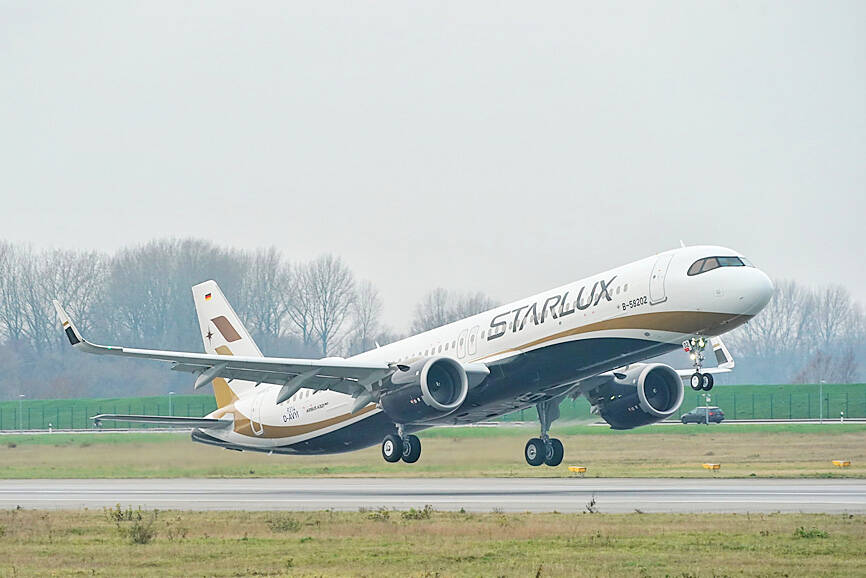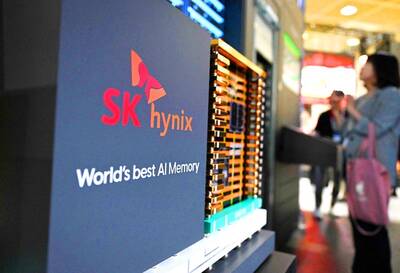Starlux Airlines Co (星宇航空) yesterday reported a net loss of NT$1.56 billion (US$51.22 million) for last quarter, widening from NT$1.44 billion in the previous quarter, as its operational costs rose on receiving new aircraft.
That brought the airline’s net losses in the first three quarters of the year to NT$4.22 billion, with accumulated net losses totaling NT$11.16 billion since its establishment in May 2018.
Revenue in the first three quarters was NT$1.77 billion, up 183 percent from a year earlier, after third-quarter revenue grew at a faster pace than in the first half of this year amid the peak travel season and eased border controls, the airline said in a statement.

Photo courtesy of StarLux Airlines Co
Third-quarter revenue grew by nearly threefold from a year earlier to about NT$760 million, with passenger revenue soaring 527 percent to NT$439 million and cargo revenue rising 169 percent to NT$290 million, it said.
Starlux expects passenger revenue to continue growing this quarter, as it is set to increase weekly flights from Taiwan to Tokyo and Osaka by about 30 percent this month, it said.
As demand for air freight has slowed, the airline plans to use its wide-body planes on the routes with comparatively high freight volume to retain revenue growth, it said.
To satisfy demand for air travel during the Lunar New Year holiday next month, the airline plans to offer more flights from Taiwan to Macau and Bangkok.
Starlux also plans to offer new flights from Taiwan to Hanoi and the Philippines’ Cebu City.
That would increase the airline's weekly flights by 10 percent, it said.
Starlux hopes to become profitable next year on a fast rebound in market demand for air travel, while the airline aims to erase its accumulated losses in five years, it said.
Separately, budget airline Tigerair Taiwan Ltd (台灣虎航) yesterday said that it would recruit an estimated 200 cabin crew and ground staff, who are expected to start working in the first half of next year.
China Airlines Ltd (中華航空) also announced that it plans to hire about 100 ground staff at Taiwan Taoyuan International Airport and customer service representatives in Taipei in anticipation of an upcoming travel boom.

Intel Corp chief executive officer Lip-Bu Tan (陳立武) is expected to meet with Taiwanese suppliers next month in conjunction with the opening of the Computex Taipei trade show, supply chain sources said on Monday. The visit, the first for Tan to Taiwan since assuming his new post last month, would be aimed at enhancing Intel’s ties with suppliers in Taiwan as he attempts to help turn around the struggling US chipmaker, the sources said. Tan is to hold a banquet to celebrate Intel’s 40-year presence in Taiwan before Computex opens on May 20 and invite dozens of Taiwanese suppliers to exchange views

Application-specific integrated circuit designer Faraday Technology Corp (智原) yesterday said that although revenue this quarter would decline 30 percent from last quarter, it retained its full-year forecast of revenue growth of 100 percent. The company attributed the quarterly drop to a slowdown in customers’ production of chips using Faraday’s advanced packaging technology. The company is still confident about its revenue growth this year, given its strong “design-win” — or the projects it won to help customers design their chips, Faraday president Steve Wang (王國雍) told an online earnings conference. “The design-win this year is better than we expected. We believe we will win

Power supply and electronic components maker Delta Electronics Inc (台達電) yesterday said it plans to ship its new 1 megawatt charging systems for electric trucks and buses in the first half of next year at the earliest. The new charging piles, which deliver up to 1 megawatt of charging power, are designed for heavy-duty electric vehicles, and support a maximum current of 1,500 amperes and output of 1,250 volts, Delta said in a news release. “If everything goes smoothly, we could begin shipping those new charging systems as early as in the first half of next year,” a company official said. The new

SK Hynix Inc warned of increased volatility in the second half of this year despite resilient demand for artificial intelligence (AI) memory chips from big tech providers, reflecting the uncertainty surrounding US tariffs. The company reported a better-than-projected 158 percent jump in March-quarter operating income, propelled in part by stockpiling ahead of US President Donald Trump’s tariffs. SK Hynix stuck with a forecast for a doubling in demand for the high-bandwidth memory (HBM) essential to Nvidia Corp’s AI accelerators, which in turn drive giant data centers built by the likes of Microsoft Corp and Amazon.com Inc. That SK Hynix is maintaining its